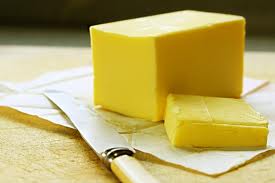Margarine is the generic term used for butter substitutes. Its history goes back almost 200 years to the discovery of margaric acid from whence margarine derives its name. Over the years various ingredients have been used to concoct a less expensive spread than butter including beef tallow, whale, seal, and fish oils, vegetable oils and sometimes even a little butter.
Both butter and margarine are water-in-oil emulsions; they have similar calories, depending on the amount of water in the margarine or “spread”. Sadly, most people erroneously think they are interchangeable.
Margarine consumption surpassed that of butter in the late 1950’s when some scientists proposed a correlation between the consumption of saturated fats and blood-serum cholesterol levels with heart disease. Doctors began advising their patients to use margarine instead of butter.
Many people still believe in this supposed cause and effect but the explosion of heart disease in our society would suggest otherwise. Food manufacturers seized the opportunity to increase profits by using cheaper inferior ingredients while proclaiming the health benefits of their products.
Margarine is a manufactured “food”, generally accomplished by passing hydrogen through (often) inferior quality oil in the presence of a nickel, cadmium, or palladium (all toxic heavy metals) catalyst. The addition of hydrogen to the unsaturated bonds results in saturated bonds, effectively increasing the melting point of the oil and thus hardening it.
This process creates trans fats, which the body does not recognize as food and ironically are now known to contribute to heart disease and other diseases like cancer. Furthermore, the oil is extracted at high temperature, which damages the oil and destroys the vitamin E in it. The advertisements and the packaging for margarine are usually deceptive lies, stating it contains ‘polyunsaturated oil’, when the processing saturates or partially saturates the oil.
Butter has many nutritional benefits, where margarine has few. Butter contains antioxidants, which help offset free-radical damage to cells. It is a source of vitamin A, D, E, and K, calcium, selenium, and conjugated linoleic acid, which helps maintain lean body mass, prevents weight gain and may reduce certain cancers. Butter fat helps the absorption of certain vitamins and minerals. And it tastes better.
Although many people are sensitive to cow’s milk dairy products, often butter is well-tolerated because butter is almost a pure fat, and does not contain many of the allergens found in other milk products.
One issue is the treatment of dairy cows. They are often pumped full of antibiotics and hormones which naturally land in the milk.
The argument that margarine helps control cholesterol is a myth as most cholesterol is manufactured within the body; a maximum of about 4% of all cholesterol comes from the diet. Cholesterol is the raw material for the adrenal stress hormones and the sex hormones. The body often reacts to stress by producing more cholesterol allowing the body to make more stress-fighting hormones. Therefore it is quite likely that the consumption of trans fats stresses the body to produce more cholesterol.
The human body is not designed to consume manufactured food but thrives on a diet of whole, real food. Butter is a natural food and one of the best sources of important fat-soluble vitamins. You will pay more for butter, but nutritionally, for its purity, and its taste it is well worth it. Just remember, all things in moderation; the body is not served by eating any fat, including butter, by the pound.
Sources for this article include:
http://www.naturodoc.com/library/nutrition/margbutt.htm
http://www.healthcastle.com/butter-or-margarine.shtml
http://www.nlm.nih.gov/medlineplus/ency/article/002114.htm
This site is sponsored by margarine producers who proclaim the “debate is over”. It is included in this list in the interest of balance:
http://www.choosemargarine.com/latestSpread_marg_vs_butter.html

